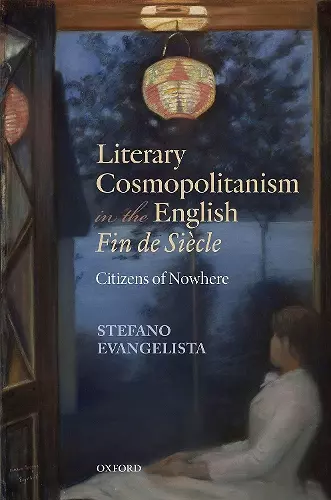Literary Cosmopolitanism in the English Fin de Siècle
Citizens of Nowhere
Format:Hardback
Publisher:Oxford University Press
Published:22nd Jul '21
Currently unavailable, and unfortunately no date known when it will be back

The fin de siècle witnessed an extensive and heated debate about cosmopolitanism, which transformed readers' attitudes towards national identity, foreign literatures, translation, and the idea of world literature. Focussing on literature written in English, Literary Cosmopolitanism in the English Fin de Siècle offers a critical examination of cosmopolitanism as a distinctive feature of the literary modernity of this important period of transition. No longer conceived purely as an abstract philosophical ideal, cosmopolitanism--or world citizenship--informed the actual, living practices of authors and readers who sought new ways of relating local and global identities in an increasingly interconnected world. The book presents literary cosmopolitanism as a field of debate and controversy. While some writers and readers embraced the creative, imaginative, emotional, and political potentials of world citizenship, hostile critics denounced it as a politically and morally suspect ideal, and stressed instead the responsibilities of literature towards the nation. In this age of empire and rising nationalism, world citizenship came to enshrine a paradox: it simultaneously connoted positions of privilege and marginality, connectivity and non-belonging. Chapters on Oscar Wilde, Lafcadio Hearn, George Egerton, the periodical press, and artificial languages bring to light the variety of literary responses to the idea of world citizenship that proliferated at the turn of the twentieth century. The book interrogates cosmopolitanism as a liberal ideology that celebrates human diversity and as a social identity linked to worldliness; it investigates its effect on gender, ethics, and the emotions. It presents the literature of the fin de siècle as a dynamic space of exchange and mediation, and argues that our own approach to literary studies should become less national in focus.
This is an expansive project, but it is grounded in rich detail. The engagement with archives, correspondence, book design, and reader's reports from the John Lane collection at the Harry Ransom Center, allows for the startling, disappointing, and inspiring elements of late-Victorian cosmopolitan practice to emerge with clarity. It is in working with the grains and textures of this history that we can see what the cosmopolitan ethos actually managed to do and exactly how and why it fell short of its aspirations. * Kristin Mahoney, Michigan State University, Studies in Walter Pater and Aestheticism *
At a time when the humanities are coming under renewed pressure to explain their real-world relevance, this book does vital work in showing how engaging with our cultural past continues to bear fruit in understanding the knotted tributaries that construct our precarious presents. * Giles Whiteley, Stockholm University, Journal of Victorian Culture *
The hope for future peace and mutual understanding expressed in the very term "Esperanto" is noble and worth striving for; in spite of its fin de siècle focus, Evangelistas stimulating book has a topicality which it is impossible to overlook. * Lene Østermark-Johansen, University of Copenhagen, Modern Philology *
All-embracing book * Lene Østermark-Johansen, University of Copenhagen *
Evangelista unravels the conflicting associations of the term cosmopolitan with polish and vagabondage, worldliness and exile - and isolates the fin de siecle as a period in which the concept of cosmopolitanism came under increasing pressure from writers * Alicia Rix, Times Literary Supplement *
There is so much to love and admire in this book. To mention his analysis of Wilde's Salomé (1893) or of Egerton's translation of Swedish prose, or of Henry James's attack on Volapük, or of the utopian ideal of a "Cosmopolitan University," is to touch just the peak of the iceberg. One can easily imagine chapters being developed out the many writers, texts, and ideas he touches upon. But considering our own political moment, what one takes out most vividly from this study is that while Evangelista's focus is on the literature and ideas emanating during the fin de siècle, the book lays bare the intricacies of our difficult present. * Ana Vadillo, Victorian Studies *
There is so much to love and admire in this book. To mention his analysis of Wilde's Salomé (1893) or of Egerton's translation of Swedish prose, or of Henry James's attack on Volapük, or of the utopian ideal of a "Cosmopolitan University," is to touch just the peak of the iceberg. One can easily imagine chapters being developed out the many writers, texts, and ideas he touches upon. But considering our own political moment, what one takes out most vividly from this study is that while Evangelista's focus is on the literature and ideas emanating during the fin de siècle, the book lays bare the intricacies of our difficult present. * Ana Vadillo, Victorian Studies *
ISBN: 9780198864240
Dimensions: 241mm x 163mm x 22mm
Weight: 614g
306 pages